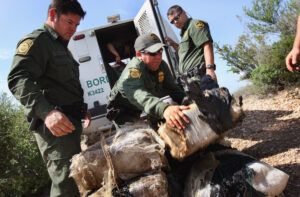For over a decade, international and Colombian human rights organizations have documented and reported on the alleged links between the paramilitary Self Defense Forces of Colombia (AUC) and state and military officials. In 2000, the US Congress enacted legislation requiring the Secretary of State to certify Colombia’s progress on human rights precisely because of those reports, and in 2001 the US State Department added the AUC to its list of Foreign Terrorist Organizations. For six years the Secretary of State certified to the US Congress and the American taxpayers that the Colombian government had made substantial progress in improving respect for human rights, including severing links between the military and paramilitary AUC, and that it was suspending and promptly investigating military officers credibly alleged to have committed gross violations of human rights. Five billion US taxpayer dollars later, the Secretary’s certification should be under growing scrutiny.
In recent months, the Colombian Supreme Court and the Attorney General’s office have opened investigations into “para-political” links. According to a May 22 Washington Post article entitled Paramilitary Ties to Elites in Colombia Are Detailed, “14 members of Colombia’s Congress, seven former lawmakers, the head of the secret police, mayors and former governors” have been charged with collaborating with paramilitary commanders, and “a dozen more current congressmen are under investigation.”
Testimony by demobilized paramilitary leaders has alleged that military officers, political elites, and businessmen in Colombia financed the growth of the paramilitary group AUC, signed a political pact with them to “refound” Colombia, and directly planned and implemented armed actions with paramilitary combatants. In his fifth round of testimony on May 15, top paramilitary commander Salvatore Mancuso stated that “paramilitarism is state policy.” He testified to meeting in 1996 and 1997 with General Rito Alejo del Rio to chart plans for paramilitary takeover of the Urabá region. In March 2004, Colombia’s former Attorney General Luis Camilo Osorio announced that he would not file charges against Del Rio, despite considerable evidence alleging ties to paramilitary groups. Mancuso had previously testified that he was involved in planning the 1997 massacre of 15 people in El Aro jointly with General Alfonso Manosalva, then commander of the Colombian Army’s 4th Brigade. Paramilitary strategist Ivan Duque, in a jailhouse interview, supported Mancuso’s statement by asking, “Do you think an irregular force of 17,000 fighters armed to the teeth could move throughout the country without anybody knowing? Without anybody collaborating?”
The Uribe administration takes credit for the investigations into the para-politics scandal, but the executive branch has not been the driving force behind these important revelations. Indeed, President Uribe is actively undermining the Supreme Court and Attorney General’s efforts to prosecute politicians for their involvement with paramilitary groups by proposing to eliminate jail time for political leaders who divulge their ties (El Tiempo, May 23). Already, the ex-Director of Colombia’s secret police agency called DAS, Jorge Noguera – who has been charged with serious crimes including rigging elections, collaborating with paramilitaries, and passing names of social activists to paramilitaries for use in targeted violence – has been released from prison on technicalities In addition, President Uribe has openly accused human rights defenders, journalists and opposition politicians who are working to document the reach of paramilitary organizations of lying, supporting guerrilla groups and attempting to undermine the Colombian security forces. Several of the groups and individuals singled out by President Uribe in these public attacks have since been threatened.
Because those who may testify about paramilitary links face inordinate risks, inadequate protection mechanisms threaten to derail these essential investigations. Senator Gustavo Petro, who as a member of the Colombian Senate’s Human Rights Commission has been instrumental in advancing investigations into links between paramilitaries and politicians, has received death threats and has had his Senate office illegally searched on two occasions by government prosecutors. One prominent victim, Yolanda Izquierdo, who provided testimony against Salvatore Mancuso, was killed in broad daylight in front of her home on January 31after begging numerous government agencies for the protection she never received. Another leader of the National Victims’ Movement, Mr. Iván Cepeda, is currently being investigated after being accused of libel and slander for his role in facilitating a public hearing process in San Onofre, Sucre, where victims testified about links between local politicians and paramilitaries. An estimated 50,000 more victims may be willing to provide testimony, but without security measures many are unlikely to participate fully in the justice process. Dozens of government prosecutors and judges have inadequate protection given the risks they are facing in investigating these crimes. Even the top paramilitary commanders detained at the maximum security prison in Itagui have received threats and have expressed their concern for their own safety and that of their families.
The Colombian Attorney General’s Office and the Colombian Supreme Court still have scant resources available to pursue all the investigations they are charged with, and the understaffed Ombudsman’s office is now charged with providing public representation for both the victims and perpetrators of individual paramilitary crimes – although they have no additional budget to allow them to do so. There are no comprehensive plans to provide adequate protection measures to judicial authorities charged with uncovering the truth behind paramilitary crimes. Thousands of bodies remain unidentified in mass graves, with inadequate access to storage facilities and forensic technology threatening this essential evidence and preventing families of thousands of disappeared people in Colombia from recovering the remains of their loved ones.
In the meantime, paramilitary groups are reportedly rearming in many regions of Colombia. The Organization of American States monitoring mission reports roughly 3,000 armed groups and other sources in Colombia have estimated up to 6,000 rearmed. These groups continue to exercise control over local populations, participate in illegal eco
nomic activities such as the international narcotics trade, and – according to recent news reports – to communicate with imprisoned former commanders. In regions like Nariño where Colombia’s guerrilla groups (mainly FARC and ELN) are also active, rearmed paramilitaries and guerrilla groups have engaged in combat, forcing the displacement of thousands of civilians. According to the most recent report from International Crisis Group, reintegration programs meant to serve demobilized combatants have experienced only limited success: for example, only 26% of demobilized fighters have jobs, only 28% have received psychological counseling, and only 10% have had access to higher education.
Apart from the scandals over links of paramilitaries to political and military elites in Colombia, we remain extremely concerned about the attacks on trade unionists, attacks which led to assassinations of 72 union members in 2006. Since President Uribe came to office a total of over 400 trade unionists have been killed, and as of April 2007 there had only been convictions in 10 of these cases.
These ongoing concerns with the situation in Colombia prompt us to urge a new US foreign policy that stresses economic aid over military aid, that supports the victims of the internal armed conflict, and that ensures respect for workers rights and human rights in Colombia.
We wish to close by expressing our strong support for all those in Colombia who are struggling to build a more democratic country through their valiant efforts to uncover the truth and seek justice. All those working on advancing these processes – whether in the courts, the media, in human rights organizations, in government agencies or in control agencies – deserve our highest regard and appreciation. We especially want to laud those victims who have suffered irreparable damages as a result of the internal armed conflict, and who are now coming forward, often at great personal risk, to give testimony and to call for justice.
Heather Hanson
Executive Director
U.S. Office on Colombia
Gimena Sánchez-Garzoli
Senior Associate for Colombia and Haiti
Washington Office on Latin America
Adam Isacson
Director of Programs
Center for International Policy
Lisa Haugaard*
Executive Director
Latin America Working Group
Stephen Coats
Executive Director
US/ Labor Education in the Americas Project
Angela Berryman
Interim General Secretary for Peace and Conflict Resolution
American Friends Service Committee
David A. Robinson
Executive Director
Pax Christi USA: National Catholic Peace Movement
Bama Athreya
Executive Director
International Labor Rights Fund
Marselha Gonçalves Margerin
Program Officer
Robert F. Kennedy Memorial Center for Human Rights
John Lindsay-Poland and Susana Pimiento Chamorro
Co-Directors
Fellowship of Reconciliation Task Force on Latin America and the Caribbean
Robin Buyers
Support Coordinator
Christian Peacemaker Teams Colombia Team
Pamela Bowman
School of the Americas Watch
Marino Cordoba
AFRODES USA
Séamus P. Finn, OMI
Director
Office of Justice, Peace and the Integrity of Creation
Missionary Oblates of Mary Immaculate
Catherine Gordon
Associate for International Issues
Washington Office, Presbyterian Church (USA)
Anne Barstow
Presbyterian Peace Fellowship
Barbara Gerlach
Colombia Liaison
United Church of Christ Justice and Witness Ministries
Cristina Espinel and Catalina Talero
Colombia Human Rights Committee
Parrish Jones
Mission Network for Colombia Presbyterian Church USA
Gabriel Camacho
Chapter President
Labor Council for Latin American Advancement
Massachusetts Chapter
Suren Moodliar
Massachusetts Global Action
Maria Elena Letona
Executive Director
Centro Presente, Cambridge MA
Russ Davis
Executive Director
Massachusetts Jobs with Justice
Burke Stansbury
Executive Director
Committee in Solidarity with the People of El Salvador, National Office
Lisa Fuller
Committee in Solidarity with the People of El Salvador, Boston Office
Roland E. Roebuck
DC Latino Community Activist
Theo Sitther
Legislative Associate for International Affairs
Mennonite Central Committee U.S. Washington Office
Gerardo Cajamarca
Steelworkers Global Justice
Melinda St. Louis
Executive Director
Witness for Peace
* connotes individual sign-on




